Blackberry plants are not heavy feeders and, after well-established, do not need much fertilizer. Excessive fertilizer can encourage the growth of wood and leaves rather than fruit production. Blackberry will grow quite well in most soil varieties except compacted clay or light chalky soil. Mixing these soils in lots of organic fertilizers to condition soil and add beneficial nutrients and bacteria plants need to be healthy will be worth your time. Let’s check out the best fertilizer for Blackberries.
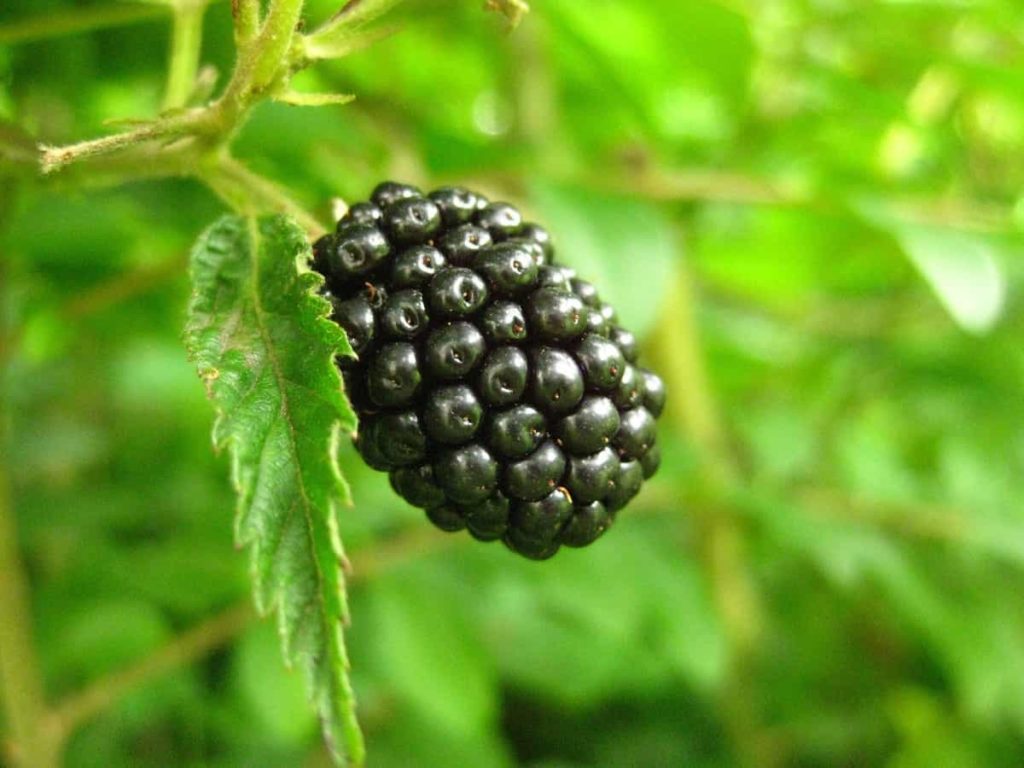
Blackberry grows and produces the best fruits in well-drained but moist fertile soil rich with organic matter. They like to keep the soil in a good water supply, mainly when the fruits are produced in the summer, but not enough water to keep the soil constantly superheated or wet. Blackberry responds well to the fertilizer applied in spring and after producing Blackberry. The best fertilizer to use contributes nitrogen, phosphorus, and potassium. These three macronutrients help Blackberry grow, have fruits and resist diseases or pests.
Suppose you are using the wrong type of fertilizer or over-fertilizing your Blackberry results in unhealthy plants. Blackberry shrubs need regular fertilization to grow large, juicy berries. Most Blackberries require only one annual fertilizer application, which is given before it grows in early spring. But some Blackberry plants need a second application of fertilizer.
While feeding other garden plants is comparatively straightforward, Blackberry has specific times of the year when they need potassium, nitrate, and other nutrients. A high level of nitrogen encourages plant growth and leaf formation in spring. Sufficient phosphorus and potassium also best support the Blackberry plant’s flower and fruit formation.
Best fertilizer for Blackberries
Homemade fertilizers for Blackberries
- Coffee grounds – Like other plants, Blackberry plants are also like coffee grounds. Blackberry responds well to any nitrogen-rich fertilizer. In addition, like other fruits and vegetables, Blackberries also prefer neutral or slightly acidic soils with an ideal pH range of between 5.5 and 7.0.
- Eggshells – Eggshells add calcium to the garden. Crush them and sprinkle them around, toss them full on the garden soil, or put them in your compost pile. It is an easy way to feed your plants.
In case you missed it: How to Start a Fruit Garden from Scratch
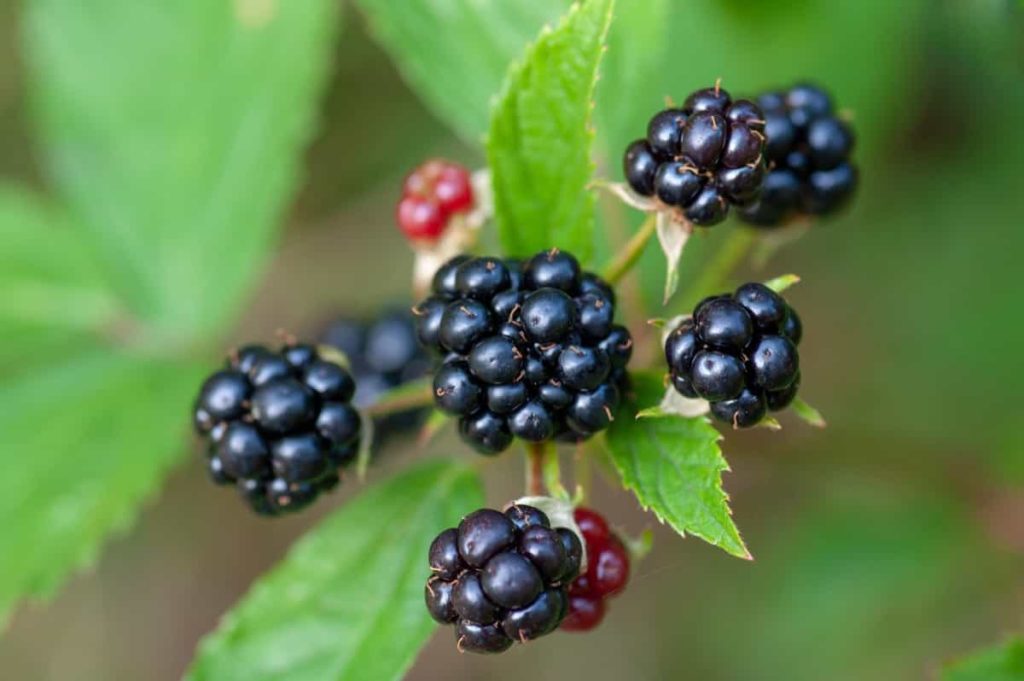
Organic fertilizers for Blackberries
- Bone meal – To feed your Blackberry bushes, sprinkle bone meal fertilizer on the soil around the base of the Blackberry plant to fortify the soil with calcium, phosphorus, potassium, and nitrogen. The best time to fertilize Blackberries is when plants start growing during spring.
- When using blood meal, cottonseed meal, or fish emulsion, fertilize in late fall before the first frost.
Natural fertilizers for Blackberries
You can also cover the land around the Blackberry plant with a layer of mulch made from lawn clippings. It decomposes over time and releases nutrients to the plant. You can also use long-term organic fertilizer if you don’t have natural fertilizer in your hand. Spread a 2 to 3-inch layer of organic mulch on your Blackberry soil.
It will help the soil to maintain water and fertilize the Blackberry as it dissolves. Make sure to place the mulch 3 to 4 inches away from the Blackberry stem and move it about 1 foot beyond the reach of the Blackberry leaves. Suitable mulching materials include pine straw, wood chips, and seed-free grain mulch such as wheat or rye.
Compost manure for Blackberries
Organic fertilizers are ideal for providing your Blackberry with nutrients. You can use garden compost or rotten manure to upgrade the poor garden soil. Make sure it is first composted if you use manure, as fresh manure can burn plants. You should apply a 2-inch-deep layer of manure around the dripline of each Blackberry plant. Consider applying a thin layer of mulch spread around, but not touching, Blackberry bush.
Liquid fertilizers for Blackberries
Another idea for the quick green-up of your Blackberry plants, try spraying plants with a weak organic liquid fertilizer foliar spray, such as fish emulation and Epsom salt (for magnesium). It should green the plants. Mix one tablespoon of organic liquid fertilizer in a gallon of water, and spray over the leaves.
In case you missed it: Top 10 Fruits To Grow In Hydroponics
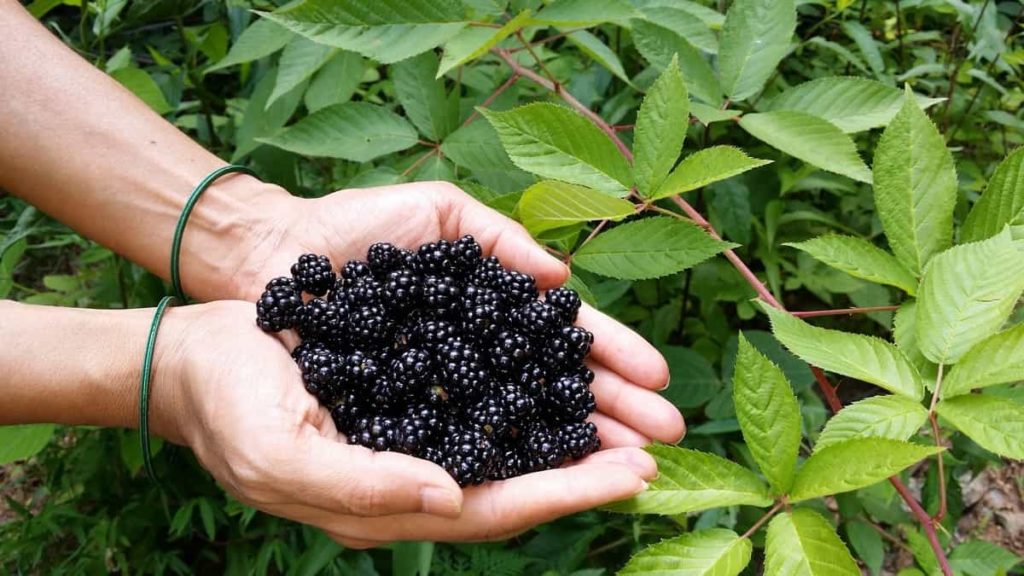
Commercial fertilizers for Blackberries
NPK ratio
- You need to use a commercial fertilizer that balances nutrients. The best formula is usually a 10-10-10 nitrogen, phosphorus, and potassium mixture. These products will also contain small quantities of other nutrients like nitrate and boron. After applying fertilizer, you should water your plants well and replace the mulch.
- Blackberry requires a minimum annual application of nitrogen-containing fertilizer for good growth and fruit production. Apply 2.3 to 2.7kg of 20-20-20 or ammonium sulfate (21-0-0) fertilizer per 100 feet.
- If plants lack vigor, apply an additional 450grams of ammonium nitrate (34-0-0) to bloom or mid-summer in a row per 100 feet just before irrigation. If you can use manure or compost, apply it in late fall or early winter to allow for the addition of salts to be let into the leaching by rain.
Blackberries fertilizer schedule
The quantity of fertilizer to use depends on your soil testing and your specific fertilizer instructions. Before applying fertilizer, lightly loosen the soil around the plant’s circle, called the dripline, with a rake. Then sprinkle Blackberry fertilizer around each plant in loose soil. Water the area well so that the fertilizer dissolves in the soil where it is available to absorb the plant. You don’t fertilize Blackberry plants for 3 to 4 months until the planting. Blackberry usually requires 2.3 to 2.7kg of nitrogen per 100-foot row.
The best choice for Blackberry consists of ammonium sulfate (21-0-0) and ammonium nitrate (34-0-0). They are applied to the soil when blooming or in the middle of summer. You can use other fertilizers during early winter and late fall. Fertilizers can leach extra salts into the soil, burning berry plants. Once the Blackberry is fully established, you should apply fertilizer to increase crop size and production. You can use 10-0-0 organic fertilizer or balanced compounds.
The fertilizer application should be completed in early summer, but fertilizer must be well watered to ensure it sinks into the ground. Follow the manufacturer’s instructions when you fertilize your Blackberry plants. Apply the fertilizer at least two inches deep and erase it from the soil you have applied. Then, water your plants with an inch of water every week. You must use the right amount. A good quality fertilizer is essential for your Blackberry health.
To increase berry production, Blackberry needs nitrogen fertilizer applications once a year. Apply organic fertilizer to encourage fruit after harvesting. You can add fertilizer to the soil in the fall and wait for the plants to grow and fruit. If you have fertile soil, it will be beneficial for your berry. Once ready for Blackberry harvesting, you should fertilize them from organic plant food. The slower-release fertilizer will work well, while organic manure will burn the berries.
It will also increase your Blackberry production. If you have too much Blackberry, you can harvest them every week. After harvesting, you can use 10-10-10 organic fertilizers twice a month. Shrubs must be fertilized regularly during the growing season to be ready to bear fruit for several months. Blackberry plants need one to two inches of water per day.
In case you missed it: Top 30 Quick Growing Fruits In Containers/Pots
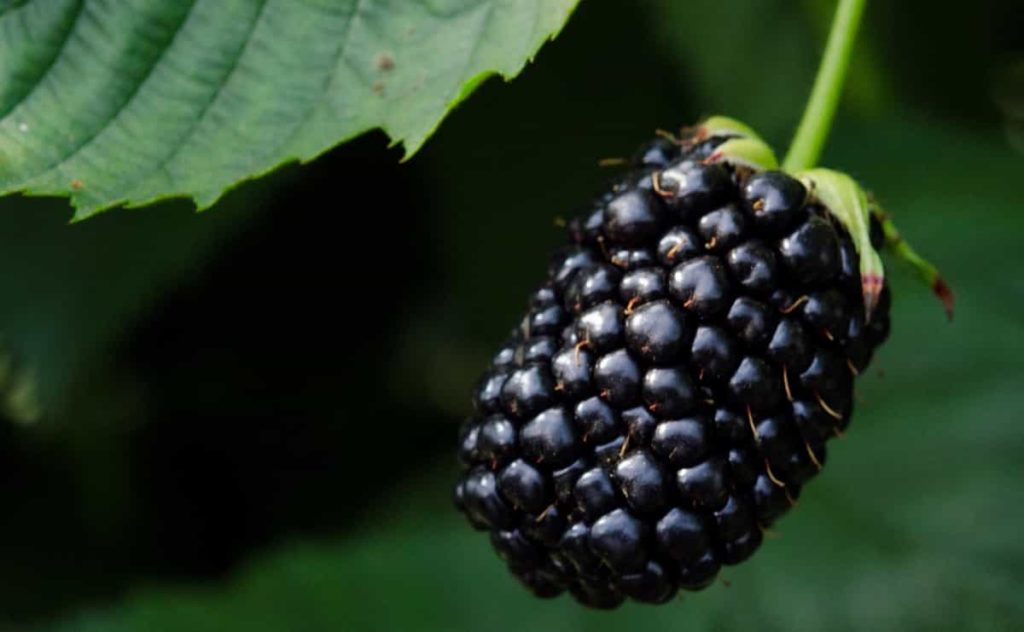
How to fertilize Blackberries in pots
Blackberry can grow in clay, metal, plastic, or wood planting containers. When choosing a pot for your Blackberry, keep in mind that metal and plastic containers preserve better moisture than pots made of clay or wood. Blackberry needs slightly organic, well-drained soil. Mix compost and river sand or perlite in garden soil for this. Compost will make soil nutritious and acidic, while river sand will make soil free-draining. You can mix cow manure and some azalea soil instead of fertilizer. Change container soil every third year with new soil.
Wait to fertilize your pot-bearing Blackberry until they develop new growth. Use a fertilizer specially designed for container gardening. Apply fertilizer as per package instructions for best results. When the plant grows actively, you can apply any general-purpose fertilizer or tomato fertilizer in spring. Combine the soil with fertilizer and then water well. It is better to sprinkle fertilizer around the edge of the pot away from the plant.
Otherwise, the plant may burn and die. You can then feed any good quality liquid fertilizer mixed with the seaweed solution every two weeks. Usefully balanced fertilizer to feed berries to promote the fruit. Once in the spring, slow-release fertilizer or regular balanced fertilizers can be used for fruit trees and shrubs every month during the growing season.
Frequently asked questions about fertilizers for Blackberries (FAQ)
Is Peat moss good for Blackberry?
If you have alkaline conditions in your garden, take steps to reduce pH and improve your soil to grow Blackberry. If your soil is slightly alkaline, you can gently lower the pH of the soil by adding peat moss and compost to the soil.
In case you missed it: Home Garden Ideas, Tips, Tricks, and Techniques
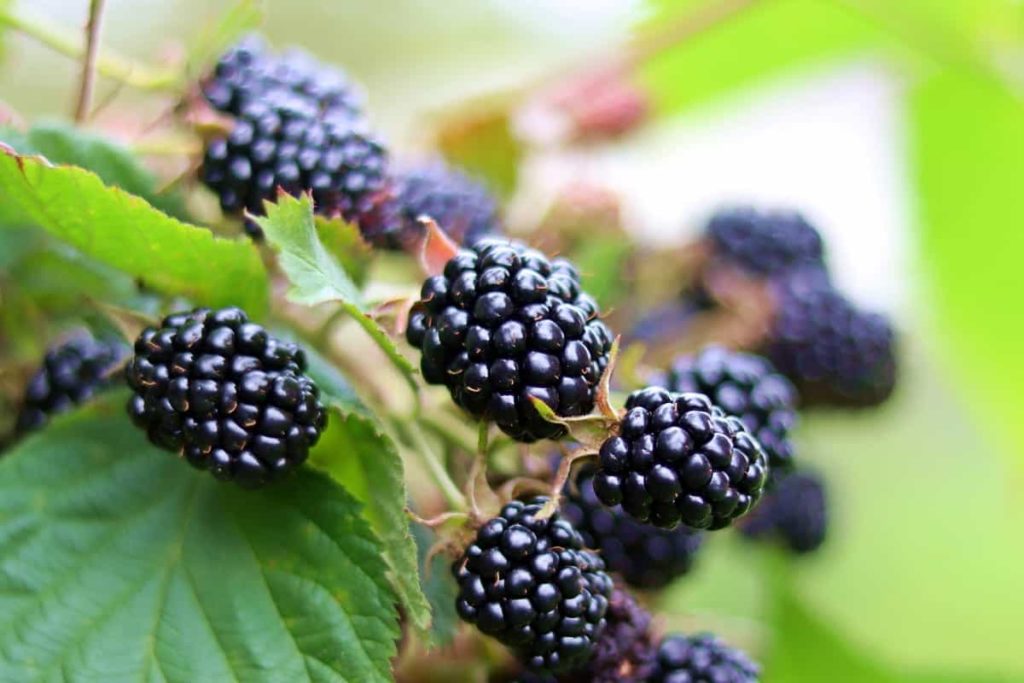
Why is my Blackberry bush not producing fruit?
Limit the use of pesticides around Blackberry bushes to ensure that pollinated plants can reach.
Is horse manure good for Blackberry?
Adding horse manure to your berry patch is a cheap, organic way to provide your berry vines with their nutrients.
Is wood ash good for Blackberry?
Because wood ash raises your soil pH, always check the soil to ensure it doesn’t become excessively alkaline. Never use wood ash on acid-loving plants such as berries, including Raspberry, strawberries, and Blueberries.
Why is my Blackberry not sweet?
The time to allow Blackberry to be ripe affects how bitter or sweet it will be. Raw berries start bitter, decreasing when they ripen on the vine. They are very sweet with no sign of bitterness when they are fully ripened.
How long do Blackberry bushes last?
Blackberry is very short-lived; they are about 15 to 20 years old with proper care. Proper maintenance of Blackberry bushes includes applying them to acidic soil and annual pruning sessions in the fall until the end of winter.
In case you missed it: How To Grow Plants From Cuttings
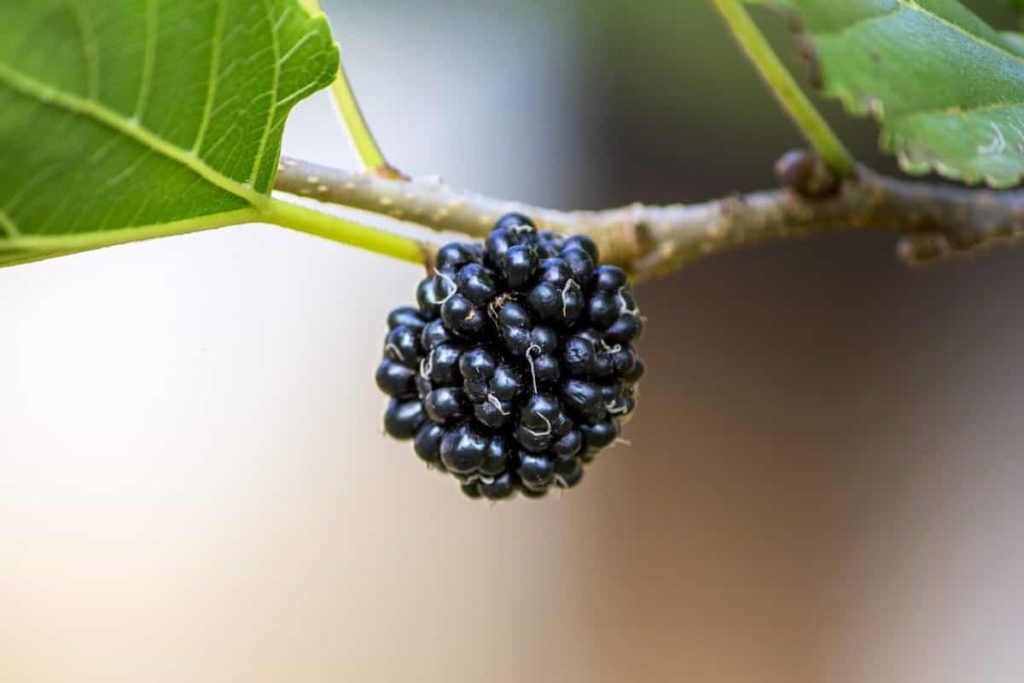
Are the leaves good mulch for Blackberry?
Grass clippings, weed-free straw or dryness, chopped tree leaves, or small particles of tree bark work well.
Can you use cedar mulch for Blackberry bushes?
You can mulch with dead cedar benefits berries, including weed control, moisture retention, and soil temperature regulation.
- How to Grow Hibiscus from Flower
- Plantation Ideas for Home Decoration: A Beginners Guide
- Flower Garden Designs and Layouts for Beginners
- Planting and Spacing Techniques in Papaya: A Beginner’s Guide
- Growing Gold: Essential Techniques for Planting Pineapples
- How to Make Kalanchoe Plant Bushy: Home Remedies and Solutions
- 11 Reasons Why Your Gardenia is Not Blooming: Home Remedies and Solutions
- Eco Elegance: The Guide to Designing a Drought-Tolerant Landscape
- Gardening on a Slope: Strategies for Hillside Landscaping
- Nourish and Flourish: Top Organic Mulches for Thriving House Plants
- Everything You Want to Know about Indian Mogra Flower: Discover Uses and Growing
- Green Thumb Success: Expert Tips for Cultivating Greenhouse Pumpkins All Year Round
- Maximize Growth & Flavor: The Ultimate Guide to Companion Planting in Herb Gardens
- How to Control Rhododendron Problems Naturally: Home Remedies and Organic Ways to Fix Them
- Natural Magic: The Remarkable Benefits of Cinnamon for Plants
- Best Steps to Revive Dying Tulip with Natural and Organic Treatment
- 10 Reasons Why Your Angel Trumpet is Not Blooming: Remedies and Treatment
- How to Fix Periwinkle Leaf and Flower-Related Problems: Natural Remedies and Solutions
- How to Fix Zinnias Leaf and Flower Problems: Discover Natural and Home Remedies
- Organic Steps to Induce Lemon Tree Flowers: A Comprehensive Guide
- Bloom Booster: Crafting the Perfect Homemade Bougainvillea Fertilizer
- Optimizing Growth: A Guide to Applying NPK Fertilizer for Potted Plants
- 10 Best Homemade Fertilizers for Rubber Plant: DIY Recipes and Application Method
- How to Boost Female Pumpkin Flowers: Effective Steps for More Flowers and High Yields
- Transform Your Indoor Garden: Top Benefits of Pink Salt for Houseplants
- 10 Best Homemade Fertilizers for Peacock Plants (Calathea): Easy DIY Guide
- Unlock Blooms: 9 Reasons Why Your Potted Chrysanthemum is Not Blooming
- 8 Reasons Why Your Potted Hibiscus is Not Blooming: Fix it with Simple Solutions
- Unlock Blooms: 9 Key Reasons Your Potted Frangipani Won’t Flower
- 10 Reasons Why Is My Ice Plant Not Blooming: Remedies and Treatment
- 10 Reasons Why My Potted Hydrangea Not Blooming: Treatment and Remedies
- 10 Reasons Why is My Wisteria Not Blooming: Remedies and Treatment
- 10 Reasons Why is My Goldfish Plant Not Blooming: Remedies and Treatment
- Maximize Your Space: Ultimate Guide to Balcony Gardening with Grow Bags
- 10 Reasons Why Your Iris is Not Blooming: Remedies and Treatment
- 10 Reasons Why Your Anthurium Plant is Not Blooming: Treatment and Remedies